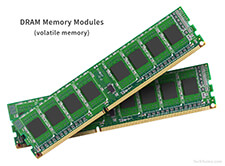Volatile Memory
Volatile memory is memory that requires electric current to retain data. When the power is turned off, all data is erased. Volatile memory is often contrasted with non-volatile memory, which does not require power to maintain the data storage state.
The most common type of volatile memory is random-access memory, or RAM. Computers and other electronic devices use RAM for high-speed data access. The read/write speed of RAM is typically several times faster than a mass storage device, such as a hard disk or SSD. When a computer boots up, it loads the operating system into RAM. Similarly, when you open an application on your computer or mobile device, it is loaded into RAM. Loading the operating system and active applications into RAM allows them to run much faster.
System RAM is the most common type of volatile memory, but several other types exist. Below are some examples of volatile memory:
NOTE: The "volatile" aspect of the term "volatile memory" refers to how data is lost when the power is turned off. It does not refer to the voltage required to maintain the data.
 Test Your Knowledge
Test Your Knowledge